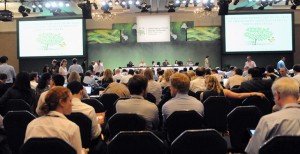We Need Kyoto
Posted on 01. Dec, 2010 by astark in U.S.A.
When something exciting happens here, rumors reverberate rapidly around the two conference centers and everyone scrambles to understand the implications. Today’s piece of news happened in the understated way that important events here usual do, with a jargon-laden intervention during the many hours of opening plenaries yesterday, when a delegate from Japan stated that Japan is categorically opposed to an extension of the Kyoto Protocol after its emission reduction provisions expire in 2012. The Japanese delegate, Jun Arima, stated in plenary that “Japan will not inscribe its target under the Kyoto protocol on any conditions or under any circumstances,” and Kuni Shimada, the special adviser to Japan’s environment minister, later confirmed this position in an interview.
Japanese opposition to a second commitment period under Kyoto wasn’t exactly a revelation, but the uncharacteristic bluntness with which it made these statements, publicly and at the very beginning of the talks, was quite unprecedented, and took many delegates by surprise. Still under hot debate here is whether extending the Kyoto Protocol is really a redline for Japan or merely an innovative negotiating tactic to be used as leverage later on. But regardless, Japan’s move plays into the hands of several other developed countries who are current Kyoto signatories who would rather not see it extended, but who also are reluctant to go out on a limb and say so themselves for fear of castigation and isolation.
The KP discussions seem far removed from any U.S. interest here in the climate talks, since the United States never ratified the protocol and President Obama has flatly refuted any suggestion that it would sign up for an extension. Reports of threatened walk-outs, or that the entire COP may dissolve due to this bottleneck, are wildly overblown. Yet there are a number of reasons why the outcome of the Kyoto Protocol discussions in Cancun are important for the United States and for the well-being of the UNFCCC process, aside from the important fact that the Protocol remains the only legally binding emissions mitigation agreement ratified by so many members of the international community and is therefore an important symbol of international commitment and action to tackle climate change.
One important but often unmentioned by-product of the Kyoto Protocol is the Clean Development Mechanism, which allows developed countries to implement emissions-reduction projects in developing countries in order to earn emissions reduction credits for themselves. The CDM has eliminated about 2.9 billion tons of CO2 equivalent and the value of credits sold last year was about $2.7 billion. CDM is therefore a key source of mitigation funds for the developing world, and a failure to extend Kyoto would put CDM at risk of collapse. This morning in plenary we heard developing countries across the board, from Saudi Arabia to Jamaica, roundly defend CDM, showing the G-77’s strong support of this program. If we lose the Kyoto Protocol, an important source of climate funds will be lost, but the important trust the negotiators have been trying to build for the last year between developing and developed countries would also be deeply shaken.
In its statements to the press, Japan reasoned that it supports a unified treaty that would include both Kyoto signatories and non-signatories, like the United States, who are currently negotiating under a separate track known as the AWG-LCA. Last night, Kuni Shimada, the special adviser to Japan’s environment minister, stated “without the active participation of the two biggest emitters, namely China and the United States, it’s not a global effort. Whatever happens, under any kind of conditions we do not accept a second commitment period.” Of course, a unified treaty would minimize the complications of the two-track negotiation process considerably. However, as things stand, it doesn’t seem likely that parties under the separate negotiating tracks will be able to resolves their differences over the legal format of a new treaty to combine the two tracks. Currently negotiators at the LCA have said that they will not be able to act decisively on a treaty without parallel movements from the KP side. Thus, a breakdown of the KP extension talks could threaten momentum towards a legally binding outcome in Durban in 2011.
Finally and most urgently, Japan’s intransigence could threaten the “balanced package” outcome here in Cancun. Negotiators have stated that movement on a Kyoto extension must be one part of this package, without which the other aspects of an agreement, including finance, adaptation, technology transfer and REDD, will also be in danger. While it doesn’t seem likely that the UNFCCC process will collapse without a Kyoto Protocol extension, forward momentum on this issue is key to getting a deal on the start of a green climate fund and technological and capacity-building assistance for the poor and most vulnerable countries that desperately need it. The outcome here certainly won’t solve the problem of climate change, but it could mark the very beginning of genuine climate justice.
Translate this page:
Negotiator Tracker - Alex Stark
Alex Stark joins the project from Washington DC, where she's focused on legislation addressing drivers of violent conflict around the world, including the effects of climate change. Tracking the US negotiators and getting the word out about action inside the UNFCCC combine her passions for activism, sustainable development, conflict prevention and US foreign policy. read more»
Read more of Alex's posts here.
Follow Alex on twitter @AlexMStark







